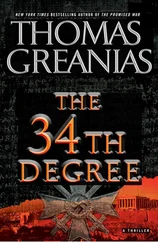Thomas Greanias - The Promised War
Здесь есть возможность читать онлайн «Thomas Greanias - The Promised War» весь текст электронной книги совершенно бесплатно (целиком полную версию без сокращений). В некоторых случаях можно слушать аудио, скачать через торрент в формате fb2 и присутствует краткое содержание. Жанр: Триллер, на английском языке. Описание произведения, (предисловие) а так же отзывы посетителей доступны на портале библиотеки ЛибКат.
- Название:The Promised War
- Автор:
- Жанр:
- Год:неизвестен
- ISBN:нет данных
- Рейтинг книги:5 / 5. Голосов: 1
-
Избранное:Добавить в избранное
- Отзывы:
-
Ваша оценка:
- 100
- 1
- 2
- 3
- 4
- 5
The Promised War: краткое содержание, описание и аннотация
Предлагаем к чтению аннотацию, описание, краткое содержание или предисловие (зависит от того, что написал сам автор книги «The Promised War»). Если вы не нашли необходимую информацию о книге — напишите в комментариях, мы постараемся отыскать её.
The Promised War — читать онлайн бесплатно полную книгу (весь текст) целиком
Ниже представлен текст книги, разбитый по страницам. Система сохранения места последней прочитанной страницы, позволяет с удобством читать онлайн бесплатно книгу «The Promised War», без необходимости каждый раз заново искать на чём Вы остановились. Поставьте закладку, и сможете в любой момент перейти на страницу, на которой закончили чтение.
Интервал:
Закладка:
The conductor of this symphony was clearly General Hamas, and Deker watched as Hamas with great fanfare pointed his thick finger at him for all to see.
"Behold!" Hamas cried out. "The Hebrew!"
He spoke as if that declarative statement were enough in itself to condemn Deker to death. And apparently it was.
There were no jeers now, only stone-cold silence around the outdoor courtyard. There would be no victory cheer until every Hebrew was slaughtered that day. He was simply to be the symbolic first. Just as Bin-Nun had made flint knives to circumcise his troops and unify them in heart and mind before battle, so Hamas was intent on using Deker's execution as a showpiece to rally Reah in preparation for the impending assault. And if Bin-Nun had his Phineas and Levites to contend with, Hamas had to appease Molech and his priests. To Hamas, Deker was just a piece of foreskin to be tossed into the fires for Molech.
Another gong sounded and the elegant but weak figure of King Alakh stood up and said, "Say your last, Hebrew."
Deker said the only thing he could say under the circumstances, which was something to support his army, his people and his faith, even if he had little to show for it.
"You hear the blast of trumpets, King Alakh!" he shouted. "You see the armies of Israel surrounding your city. You have been warned. And still you have not surrendered or spared the lives of your people by letting them leave your gates. Their blood will be on your hands, not ours. Leave now and save yourselves from total annihilation. Mark my words, this city will be rubble and dust on the ash heap of history before the sun sets today."
King Alakh looked at General Hamas and, for the benefit of the people, asked aloud, "Is what this Hebrew says true?"
"No, great King," Hamas replied.
The whole exchange seemed scripted to Deker, and he expected Hamas to produce the C-4 bricks as evidence of his success in smashing the Hebrew plot to bring down the walls.
In fact, he was hoping for it.
But Hamas produced no magic mud bricks. Instead, he dramatically marched over to the pile of corpses by Molech and made a sweeping gesture with his hand.
"Recognize any friends, Hebrew?"
Deker stared. Four of the twisted faces on top he recognized as belonging to some of the Gadites who had joined up with Bin-Nun at Gilgal. He began to gag at the back of his throat.
The corpses being fed to Molech were Israelite troops.
"Behold the treachery of the Hebrews!" Hamas declared. "Their evil designs have been thwarted."
Panic washed over Deker as he tried to think where the soldiers had come from, what this all meant. The temple guards lifted one of the dead Gadites by the head and feet and began to swing him to and fro before flinging him into the fiery furnace for Molech to devour.
A flare from the great stone oven stabbed outward and singed the brows of one of the guards, who winced in agony but refused to cry out before Hamas, who, having firmly dug the knife of condemnation in Deker's back, decided to give it a final twist.
"This stupid, mindless spy was yet another ruse of Bin-Nun's, a decoy to the real plot to destroy us. Fortunately, they had help from one of our informants."
A side door in the fortress wall opened and out walked two Reahn guards, followed by Rahab.
43
She wore a flowing white robe with her braided hair piled on top of her head like a goddess. Deker watched her turn to face the king and tribunal. She didn't even glance at him as Hamas spoke.
"Rahab the priestess of Molech will now testify to the treachery of the Hebrews and the courage of our soldiers!" Hamas shouted out.
"The spy came to me again six nights ago," she declared. "He told me he would use magic mud bricks to open their own gate in our wall."
"Magic mud bricks," Hamas repeated for all to hear. "Are these the magic mud bricks he showed you?"
Deker craned his neck as Hamas pulled off a white cover from the stack of ten C-4 bricks on the table by the tribunal. His heart skipped a beat with hope. Somehow, should he be afforded some Samson-like moment, he would use the bricks to bring down the walls of the fortress on top of them all.
"Yes, General Hamas," Rahab replied, in a monotone that told Deker that she, too, had been carefully coached on what to say. "He told me the clay had come from the moon."
"And what did he tell you his plans were?"
"He told me the Hebrew plan was for me to harbor him six nights until today, at which point he would be given a signal to destroy our walls with these magic mud bricks. But he instead chose to disobey the orders of General Bin-Nun and attempt to bring down our walls the first night. This is when he was captured by you, General Hamas."
Hamas nodded, and then shocked Deker with his next question: "But this wasn't the real Hebrew plan, was it?"
"No," she replied.
Hamas asked, "What was the secret plan of General Bin-Nun, kept even from his unfortunate spy here?"
"The very next day, when the Israelite army first marched around our walls, six more Hebrews climbed into my window," Rahab testified. "The dust kicked up by the Israelite army circling our walls blinded our sharpshooters and provided the Hebrews the cover they required."
"And this event was repeated again each successive day until this morning, was it not?" Hamas asked her. "Every day another six Hebrew soldiers, under the cover of dust, would climb up our wall and into your cellar until all thirty-six had been assembled to carry out General Bin-Nun's true plan to bring down our city."
"Yes, General Hamas."
Deker swallowed hard. So that's why Bin-Nun had been so keen for him to secure a scarlet cord in Rahab's window, Deker realized. It wasn't to mark her house so invading troops could avoid it: it was to mark her window so these secret platoons could enter the city after him.
Hamas looked at him with hate-filled eyes and a triumphant smile. "A plan he kept secret even from this sorry spy and sacrifice before us this morning."
"Yes," Rahab said, still avoiding his gaze.
"And what exactly, Priestess Rahab, was Bin-Nun's plan for this secret force of thirty-six men?"
Rahab now turned to Deker, with anything but hate and only sorrow in her eyes. "The plan was to sneak enough troops into the city through my window to create a force just large enough to rush our guards stationed inside the main gate, kill them and then open the gate for the Israelite invaders."
Now the gasps and jeers finally erupted all around as the simplicity and audacity of the Hebrew treachery was revealed. And Deker was one of those who gasped, personally feeling the sting of betrayal not only from Rahab but more pointedly from Bin-Nun.
This was just like crossing the Jordan, Deker thought bitterly. Bin-Nun may have hoped for the best, but he had anticipated the worst. That meant he had expected Deker to fail all along with the C-4. So he instead used him to secure Plan B, which in all probability was Plan A from the get-go: sneak a covert force into the city and open the gates from the inside. Once inside, they could use battering rams to blow the walls outward. The very same plan that the ancient Greeks would use centuries later with their Trojan horse.
"And how far away is your home from the city gate?" Hamas pressed Rahab.
"It is only fifty cubits away."
Hamas nodded. "So they could rush the gate from the inside in moments and catch our men by surprise."
"Yes. As soon as they heard the signal this morning."
"And what is that signal?"
"A ram's horn, followed by a war cry."
Murmurs everywhere, and Deker didn't know if the sound was of relief that the plot had been exposed or the realization that the horn could blow at any moment and the assault would begin.
Читать дальшеИнтервал:
Закладка:
Похожие книги на «The Promised War»
Представляем Вашему вниманию похожие книги на «The Promised War» списком для выбора. Мы отобрали схожую по названию и смыслу литературу в надежде предоставить читателям больше вариантов отыскать новые, интересные, ещё непрочитанные произведения.
Обсуждение, отзывы о книге «The Promised War» и просто собственные мнения читателей. Оставьте ваши комментарии, напишите, что Вы думаете о произведении, его смысле или главных героях. Укажите что конкретно понравилось, а что нет, и почему Вы так считаете.












